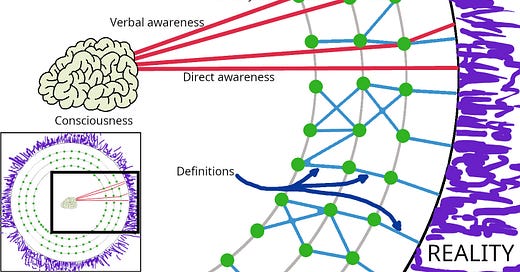How You Are Living in a Bubble of Words
Language both describes and insulates us from the world
I have written about how language is a new way of understanding the world:
a house of understanding whose foundation rests on the ground of experience and whose bricks are ideas stacked one on top of another and held in place by the mortar of logic.
In writing about beliefs, I described how ideas may vary:
They are like a geodesic dome of struts and joints where the joints on the ground are your direct experience, the struts are inferences, and the joints in the air are beliefs. Just like a geodesic dome, a collection of beliefs can form a stable belief system that is resistant to change, but this framework may not be the only or the best one. Just like a dome, the same basic facts can support different belief systems.
Rather than a geodesic dome, the diagram above is a different metaphor for language showing how language both describes and insulates us from the world. Primary words describe aspects of reality that we can point to. Secondary and tertiary words are inferences and concepts. (They aren’t really distinct layers; I have drawn them that way to represent words with increasingly tenuous connections to reality.)
Primary words have more meanings because they are used as metaphors for more abstract ideas. I sorted the open source dictionary Wordset by the number of meanings for each word, and the 10 words with the most meanings (more than 40 each) were cut, break, run, play, make, light, hold, give, draw, and clear. More abstract words like atoms, germs, God, socialism or justice only had two or three meanings.
Our understanding of the world is expressed largely in language. The diagram shows that our consciousness interacts with reality almost exclusively through words. In general, as soon as we perceive something, a word springs to mind.
Imagine a friendship. You suddenly notice that they have been brusque for a couple of days, but it wasn’t until you could put a name to it that you were aware of it. And the more specifically you can describe the sense, the better you can deal with the situation. Have they been withdrawn, snippy or critical? Do you perceive them as hurting, grieving or in shock?
For anything, the more precise your words are, the better your understanding. Is it a tree or an elm, aspen, oak, black oak, coast live oak? How many forms of snow can you recognize?
Our perceptions are represented by words and so they are contaminated or possibly totally replaced by our understanding of the words. By placing all our perceptions into word boxes, nuances may be lost.
When it comes to non-primary words, there are differing levels of agreement on their meanings. Some are widely accepted, like the existence of atoms or germs, while more abstract words like God, socialism or justice are used in vastly different ways. For instance, after quoting the dictionary definition of socialism to a Substack reader, he replied:
Yes, Phil…I know what socialism is.
You don’t.
I’ll define it for you:
“A proven failure of a political/economic system whereby government is seen as the arbiter of all that is good and just in life, despite centuries of evidence to the contrary. In an effort to make things “fair,” socialism makes things into shit, instead. The only equality socialism brings is misery and poverty. Those who prefer it are typically ignorant and inexperienced.”
The diagram also shows that consciousness can have a direct awareness of reality unmediated by words. This has interesting implications that merit discussion in a separate post.
I'm Phil. I am fascinated by language, its power, and its limitations. I find the nature of consciousness to be a great mystery. I am obsessed by the roots of political conflict. Join me in making sense of the world.





Great diagram of reality coming into the brain through tree-like tessellation of hierarchies.
I like the semiotics of Peirce based on phenomenology 1stness, 2ndness and 3rdness which is something like impression, recognition and relatedness for how the incoming sense data gets processed into knowledge and even wisdom.
And Korzybski had the Structural Differential for that. (I think it was some kind of manifold like how position, movement and acceleration are a derivative of its prior.
The General Semantics people did some fine clear writing.They had a journal ETC about trying to get free from always thinking the map was the territory and be mindful that a thing was changing under our categories.
They had non-Aristotelian logic where they tried to banish the copula of being "is" from discourse.
It is really inspiring to see what you are doing.